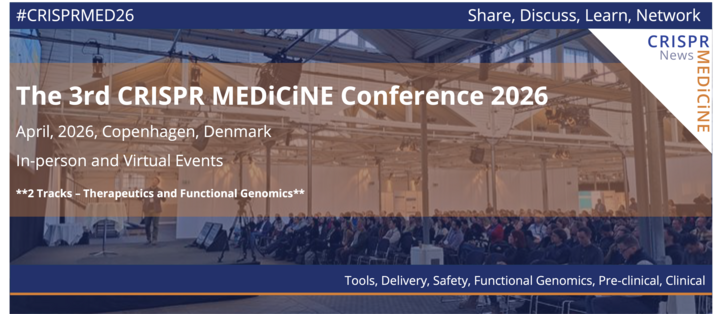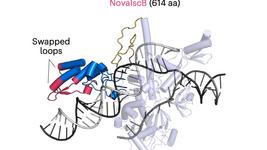CMN Weekly (10 March 2023) - Your Weekly CRISPR Medicine News
By: Gorm Palmgren - Mar. 10, 2023
Top picks
- Preclinical experiments in human retinal organoids and in vivo in a mouse model demonstrate the efficacy of a CRISPR-Cas9 mediated method for regression of choroidal neovascularization that is part of age-related macular degeneration (AMD). Researchers in South Korea developed a technique using tissue-specific promoters to ablate the Vegfa gene only in the retinal pigment epithelium (RPE). The authors argue that the cell type-specific CRISPR-Cas9 system can reduce unwanted off-target effects.
- Italian researchers report the development of a base editing strategy to repair a mutation causing cystic fibrosis (CF). The 2789+5G>A CF transmembrane conductance regulator (CFTR) gene mutation causes an aberrant splicing and a non-functional CFTR protein. The method used a specific adenine base editor (NG-ABEmax) delivered as mRNA to patient-derived rectal organoids and bronchial epithelial cells. Base editing led to sufficient gene correction to recover the CFTR function while reducing bystander and off-target activities.
Research
- Researchers in South Korea have developed a new SpCas9 variant, Sniper2L, that combines high fidelity and high activity. Sniper2L was developed using directed evolution of Sniper-Cas9, and it was shown that its high specificity originates from its superior ability to avoid unwinding a target DNA containing even a single mismatch.
- CRISPR-Cas-based methods for eliminating specific bacterial strains, such as antibiotic-resistant bacteria in the microbiome, are hampered by so-called escapers that mutate the plasmid-encoded Cas9 molecule and thus survive. However, Chinese researchers now show that the insertion of the transposable element IS5 is a common cause of Cas9 inactivation, and they have devised a strategy to overcome this problem. The two-fold solution is to eliminate the insertion process's genetics and increase the copy number of the Cas9 gene.
- American researchers have developed a versatile, chemically controlled, rapidly activated Cas9 switch, ciCas9, that can confer temporal control over seven Cas9 effectors. These effectors include two cytidine base editors, two adenine base editors, a dual base editor, a prime editor and a transcriptional activator.
- Researchers in the US have engineered Cas9 variants that suppress imprecise by-product edits and instead promote precise edits. This was achieved after the researchers first showed that the DNA break structures made by various Cas9 genome editors determine the frequencies of different repair pathways.
Industry
- Verve Therapeutics reports promising preclinical results from its VERVE-201 base-editing candidate that inactivate the ANGPTL3 gene, which regulates blood plasma levels of LDL cholesterol and triglycerides. Experiments in monkeys demonstrate that the therapy is well-tolerated, leading to a 96% reduction in ANGPTL3 protein expression.
- Korro Bio, a leading RNA editing company, and Genevant Sciences, a leader in lipid nanoparticle (LNP) nucleic acid delivery, have entered into an agreement with non-disclosed terms. Korro Bio's technology, OPERA, uses the natural enzyme ADAR to deaminate A to I in target mRNAs, thereby producing therapeutic proteins.
- Ring Therapeutics, a gene therapy company, has raised $86 million in Series C funding, bringing its total funds to $230 million. The company's Anellogy platform uses commensal anelloviruses to deliver gene therapy cargo to otherwise unreachable organs and tissues.
Financial results and updates
- Cellectis provides business update and reports fourth-quarter and full-year 2022 financial results. The year ended with a cash position of $95 million. In addition, the company entered into a €40 million credit facility with the European Investment Bank and closed an approximately $25 million follow-on equity offering.
- Poseida Therapeutics provides updates and financial results for the fourth quarter and full year of 2022. The year ended with a cash position of $283 million, revenue of $131 million and a net loss of $64 million.
- Precision BioSciences reports the financial results of the fourth quarter and fiscal year 2022 and provides business updates. The year ended with a cash position of $190 million, revenue of $25 million and a net loss of $112 million.
- Caribou Biosciences reports fourth quarter and full year 2022 financial results and provides business update. The year ended with a cash position of $317 million, revenue of $14 million and a net loss of $99 million.
Detection
- Chinese researchers have developed a CRISPR-Cas12a-assisted assay for the ultrasensitive detection of pathogens. The method employs direct digital dual-crRNA (3D) and an adsorption-free self-priming digital chip. For example, the assay could directly detect Salmonella in milk without nucleic acid extraction.
- A new CRISPRCas12a-based method for electrochemical detection of the p53 gene uses exponential amplification reaction (EXPAR). Experimental results show that the electrochemical sensor exhibits wide ranges from 500 aM to 10 pM and 10 pM to 1 nM, as well as a relatively low limit detection of 0.39 fM, which is about an order of magnitude lower than that of fluorescence detection.
- Researchers in China have developed a one-pot RPA-Cas12a assay for instant and visual detection of Burkholderia pseudomallei - the causative agent of melioidosis, a potentially life-threatening infectious disease. The streamlined workflow can be completed in around 30 min with a detection limit of 61.5 CFU/mL in spiked blood samples.
- A new CRISPR-Cas12a-based assay allows ultrasensitive and rapid electrochemical detection of MiRNA-31 in saliva - a reliable diagnostic marker for early-stage oral squamous cell carcinoma (OSCC). The method employs a Cas12a-based nano-harvester activated by a polymerase-driven DNA walker named dual 3D nanorobots.
Reviews
- Therapeutic Applications of CRISPR/Cas9 Gene Editing Technology for the Treatment of Ocular Diseases. This review provides an overview of the CRISPR/Cas9 system and summarizes recent advances in the therapeutic application of CRISPR/Cas9 for treating various ocular pathologies and future challenges.
- Outlook on the Security and Potential Improvements of CRISPR–Cas9. This review focuses on the risks brought by gene editing therapy to the patient genome, which provides a broader perspective for exploring and improving the security of gene editing therapy from two aspects of delivery system and CRISPR editing tools.
- Potential of the endogenous and artificially inserted CRISPR-Cas system for controlling virulence and antimicrobial resistance of food pathogens. This review also widens the discussion of the CRISPR-Cas use for controlling food pathogens by editing genes associated with virulence modulation and reversal of antimicrobial resistance.
- Clustered Regularly Interspaced Short Palindromic Repeats (CRISPR) in Cardiovascular Disease: A Comprehensive Clinical Review on Dilated Cardiomyopathy. This review concludes that CRISPR gene editing has shown promise in developing precise and genotype-specific therapeutic strategies for DCM. Still, challenges and limitations exist, such as delivering CRISPR-Cas9 to human cardiomyocytes and the potential for unintended gene targeting.
- Diverse mechanisms of CRISPR-Cas9 inhibition by type II anti-CRISPR proteins. This review focuses on the inhibitory mechanisms of anti-CRISPRs active against type II CRISPR-Cas systems and briefly discusses their biotechnological applications.
Meetings and notifications
- CRISPR - Genome editing in Medicine and Agriculture. This one-day conference on April 16 is held at the Weizmann Institute of Science, Israel will include 16-18 oral presentations of 15 minutes each covering advances in genome editing technologies as well as applications in medicine and agriculture.
- CAR T Cell Therapy and Advances in Cellular Engineering. A two-day symposium on June 6-7 at the Technical University of Denmark will discuss the latest advances in CAR T cell therapy and cellular engineering.
- The European Union’s Horizon Europe research and innovation programme has funded a project, EDITSCD, to understand the molecular and cellular mechanisms underlying sickle cell disease (SCD) and hematopoietic stem/progenitor cells (HSPC) dysfunctions and evaluate the impact of genome editing approaches on SCD HSPC.
News from CRISPR Medicine News
- On Monday, we brought an interview with Caribou Biosciences' CSO, Steve Kanner. He tells about the company's Cas12a chRDNA technology that takes a unique approach to CRISPR-Cas editing. chRDNA is a guide that can eliminate or reduce off-target editing by combining DNA and RNA bases in its sequence.
To get more of the CRISPR Medicine News delivered to your inbox, sign up to the free weekly CMN Newsletter here.
Tags
CLINICAL TRIALS
Castration-Resistant Prostate Cancer, CRPC, and Salivary Gland Cancer, SGC, (NCT04249947)
Sponsors:
Poseida Therapeutics, Inc.
Sponsors:
Poseida Therapeutics, Inc.
IND Enabling
Phase I
Phase II
Phase III
IND Enabling
Phase I
Phase II
Phase III
IND Enabling
Phase I
Phase II
Phase III







